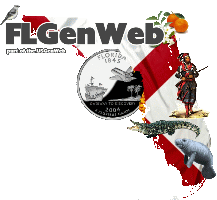|
In 1513, nearly 350,000
estimated Native Americans resided in Florida
when Juan Ponce de Leon first caught site of the
east coast. The original inhabitants in the
Florida area included the Apalachee, Calusa,
Choctaw, Creed, Miccosukee, Tequesta, Jeaga, Ais
and Timucua tribes. The Native people of Florida
still influence the modern day area, especially
in the names of local cities and towns.
Here you will find a list
of Florida places named after Indians and their
English translation.
Abina –
To camp
Achatto – Rock
Achaka – Creek
Landing
Achee – Corn
Achena – Evergreen
Achisi – Those who
speak a different language
Ahassee – Aged
Ahecka – Outlook
Ak-lowahe – Marshy
Alaiki – Location
Algi – To bring
together
Anati – Brush
Apaiki – Inward
Apelka – Amusement
Apalachi –
Accomplice
Apalachicola –
Alternate group of people
Apelichi – To take
control or rule
Api – Stalk or
core
Apilalica – To
retreat
Apokta – Next or
subordinate
Aripeka – Titled
after Miccosukee chief, Sam Jones
Aripeika –
Accumulation at the foundation
Asha – To rest or
settle
Ashee – Brew
Aspee – Grain
Atapha – Dogwood
tree
Bithlo – Paddled
boat
Cale – Berry or
produce
Champuli –
Nectarous
Chamke – Extended
Chattahoochee –
Stone brand
Chatte – Blush
Chatto – Rock
Chaweta – To
retrieve
Chee, Ochee –
Inferior
Chi – To be seated
or at rest
Chicaza –
Habitation or colonization
Chikki – Of age
Chiska – Tree
foundation
Chucu – Dark or
inky
Chuko, Choko –
Home or residence
Chule – Pine tree
Chumuklita – To
bend from the waist
Chupo, Sakwee –
Aged acreage
Coosa – Title for
Creek Indians
Echo, Etcho –
Hoofed animal
Ekana – Soil or
landscape
Elee – Impression
Ena – Torso or
trunk
Este Isti –
Individual
Eto – Plant
enclosed in bark
Fakka – Workable
earth material
Fekseko – Cold or
without feeling
Ferna – Transverse
Fenholloway – Of a
high level
Feno – Ossein
Fenoke, Fenogi –
To vibrate or shake
Funka – To spot
Hacha, Hatchee, Hatcha –
Body of water
Haihagi – To
grumble or grunt
Haihayaki –
Unclouded
Halhauwe – Tall
Halpata –
Alligator
Hasse – Brightest
star
Hastula – Cold
season of the year
Hatke – Lacking
color
Haya – Creator
Hayo – High
temperature
Hechee – To
perceive with eyes
Helukwa –
Saccharine tree gum
Heniha – Leader or
guide
Hialeah –
Grassland of beauty
Hiepus – To depart
Hilis – Acceptable
Hilis Haya –
Clergyperson or pharmacist
Hiyo – Time of
harvest
Hocha – Labled
Homosassa – Place
of growing wild peppers
Huethle – To be
vertical or erect
Kala, Kali –
Watering place
Kasappe – Chilled
Ibi – Collection
of liquid
Ibita – Group
living at the base of a stream
Imala – Warrior
class or division
Ipita – To be
unclothed
Isi – Green
foliage of a plant
Isto, Ishto – Of a
great size
Ishtoble – Water
current of a great strength
Itopa – Opening
Lagana – Sunny
color
Laiki – Location
Lako, Thako –
Abundant
Lane – Amber color
Leechee – Assassin
Locktsapopka –
Location where acorns are consumed
Lusa, Luste – Dark
or inky in color
Mado – To express
gratitude
Maskig – Bog
Mekko, Micco –
Ruler
Micanopy – Person
in charge or leader
Miccosukee –
Authority of the Hog clan
Mony, Moni – Body
of water
Muskagoo –
Marshland
Muskeg – Everglade
Muskiegui – Small
collection of fluid
Nakla – To scorch
Nokose – Bear
Ocala – Extremely
hazy or dark
Ochee – Tiny in
size
Ocheesee, Ochi –
Rosewood
Ocheesulga – Leaf
people of those who speak another language
Oka, Oki, Ooka –
Water
Okchoyce –
Granular body of water
Okla, Okli –
Humans
Omeyes – Us
Omis – Me or I
Opa Locka – Large
marsh
Osapa – Field of
corn
Oski – Falling
water
Otahita – Humid or
wet
Ote – Secluded
piece of land
Owa, Owewa – Aqua
Pakana – Peach
Palatka –
Transverse
Paneta – To move
to a body of music
Pansfalaya –
Lengthy hair
Panasoffkee –
Extending gorge
Panshi – People of
bread
Pensacola – Those
with long hair
Pinwa – Fowl
Pokko – Sphere
Polokse, Paloga –
Circular
Pon – To transport
Pu-can – Apple of
May
Sarasota –
Noticeable landfall
Semoli – Untamed
Sokhe – Swivel
Sopchoppy – Oak
red in color
Steinhatchee –
Creek of a dead man
Stilpaika – Shoe
of leather
Sucaw – Swine
Sule – Buzzard
Sumka – One that
leaves
Suwani – Imitation
Taca – To propose
for acceptance
Tachki – Outer
limit
Tala – Palm tree
Talak, Talako –
Bean
Tallahasee – Town
of age
Talofa – Community
Tali – Stone
Talwa – Tribal
community
Tapha – Vast
Tapola – Corn
Taske – Bird that
pecks wood
Taski – Fighter
Tastanagi –
Military leader
Telogi – bean
Thlako, Lako –
Major
Tofambo – Onion
Tohopke – Camp
Tolke – To descend
Toochenan – The
third
Totolose – Poultry
Tysoyaha –
Children of the sun
Wahkola – Loon
river
Wakken – To be
vertical
Wasa – A good way
Washa – Place for
chase and kill
Wauchula – House
of the cow
Weeki Wachee Springs –
Small springs
Wekiwa – Fountain
of water
Weso – Yellowwood
tree
Wetumke, Wetamke –
To make a loud noise
Wewa, Owa, Owewa –
Aqua
Wewahitchka – Eyes
filled with water
Wewasicataw –
Emerge in water
Willa – To be hard
to grasp
Yahola – A person
of Hayayulgee
Yaholagi – Imalas
used to aid the assembly
Yamasi – To make
peace
Yatika – To
interpret
Yeehaw – The wolf
Yu – To be far
away
Yui-tci – To relax
at a span
|
![]()

